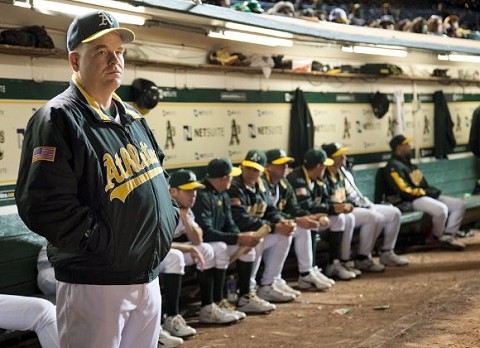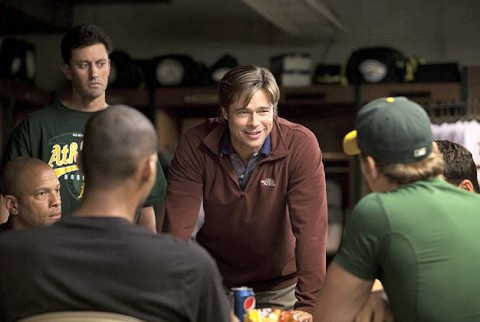Brad Pitt is getting rave reviews and there's 'buzz' about a possible Oscar nomination for his performance in a new film set inside American professional baseball. Moneyball is based on a true story.
"There are rich teams and there are poor teams. Then there's 50 feet of crap ...and then there's us."
A decade ago, Billy Beane was the newly named general manager of the Oakland Athletics baseball team. Wealthier clubs were luring away all of his star players; and the northern California team could not match those lucrative contract offers.
BEANE: "I need more money."
OWNER: "We're not New York. Find players with the money that we do have."
While the A's scouts set out to recruit young, unseasoned college and high school players to fill out the roster, Beane happened on young economist Peter Brand who used statistical analysis ...a mathematical technique called "saber metrics" ...to build an affordable team that could win games.
PETER: Your goal shouldn't be to buy players, your goal should be to buy wins and in order to buy wins you need to buy runs."
BEANE: "Who are you?"
PETER: "I'm Peter Brand."
BEANE: "First job in baseball?"
PETER: "It's my first job anywhere."
The technique confounded the experts, but produced a team that fit the Oakland budget ...and could win games.
Brad Pitt stars as Billy Beane and is also a producer on the film that went through several writers and directors before Pitt was able to get it made.
"It's complicated material," notes Pitt. "It's not your conventional story or storyline, but I couldn't let go of the story of these guys who were trapped in an unfair situation and by necessity they had to think differently. They had to reinvent themselves and in doing so they really tested who they were."
PETER: "I believe there's a championship team that we can afford because everyone else undervalues them."
BEANE: "If we win with this team we'll change the game."
Philip Seymour Hoffman in a scene from "Moneyball" Photo: Sony Pictures
The director of Moneyball is Bennett Miller, who earned an Oscar nomination in 2005 for "Capote," another film based on true events. In this story, Miller says he was especially interested in how Billy Beane dealt with his own history as a promising young player whose career in the big leagues never worked out ...at least not on the field.
"It is very much a film about baseball, but I saw it as a film about a guy whose life did not turn out the way it was supposed to ...the way it had been described to him," explains Miller. "He had a destiny that he was going to be great and it took him more than a decade before he accepted that things were not going to happen and now he could accept that this is his life or he could begin to question what had happened. Once you begin to pull on that string and really challenge everything that you know about yourself, about your past and about decisions you've made, it ends up being much bigger than a sports story."
Brad Pitt in a scene from "Moneyball" Photo: Sony Pictures
Star and producer Pitt believes that is why Moneyball has something to say to audiences beyond just sports fans:
"I think at the end of the day it's a story about our values ...about how we value other people," Pitt says, "what we value as success, what we value as failure [and] how we understand our own value."
The film is adapted from the 2003 book by Michael Lewis titled Moneyball: The Art of Winning an Unfair Game. It co-stars Jonah Hill as the bright young economist Peter Brand, with Phillip Seymour Hoffman as the "A's" veteran manager Art Howe, who battles against the new methods.
The statistical analysis technique of building a team proved so successful that sports managers from around the world have traveled to Oakland to learn about it from Billy Beane.
September 26, 2011

Photo: Sony Pictures
Brad Pitt in a scene from "Moneyball"